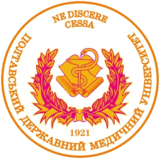Please use this identifier to cite or link to this item:
http://repository.pdmu.edu.ua/handle/123456789/11453| Title: | Психосоціальна дезадаптація жінок із психогенними депресивними розладами |
| Other Titles: | Психосоциальная дезадаптация женщин с психогенными депрессивными расстройствами Psychosocial maladaptation of women with psychogenic depressive disorders |
| Authors: | Скрипніков, Андрій Миколайович Скрипников, Андрей Николаевич Skrypnikov, A. M. Ісаков, Рустам Ісроїлович Исаков, Рустам Исроилович Isakov, R. I. Фисун, Юрій Олександрович Фисун, Юрий Александрович Fysun, Yu. O. |
| Issue Date: | 2019 |
| Publisher: | Українська медична стоматологічна академія |
| Citation: | Скрипніков А. М. Психосоціальна дезадаптація жінок із психогенними депресивними розладами / А. М. Скрипніков, Р. І. Ісаков, Ю. О. Фисун // Вісник проблем біології і медицини. – 2019. – Вип. 2, т. 1 (150). – С. 203–206. |
| Abstract: | Досліджено особливості психосоціальної дезадаптації у жінок із психогенними депресивними розладами різного ґенезу для визначення в подальшому вузько-специфічних мішеней диференційованої психосоціальної реабілітації цього контингенту пацієнтів. Виділено «пускові», найбільш патогенні фактори, що відігравали провідну роль у розвитку психосоціальної дезадаптації, а отже потребували першочергового подолання (зменшення впливу). Отриману інформацію можна використати як основу для розробки диференційованої програми реабілітації та психопрофілактики психосоціальної дезадаптації у жінок, хворих на психогенну депресію; Исследованы особенности психосоциальной дезадаптации у женщин с психогенными депрессивными расстройствами различного генеза для определения в дальнейшем специфических мишеней дифференцированной психосоциальной реабилитации контингента пациентов. Выделены «пусковые», наиболее патогенные факторы, которые играли ведущую роль в развитии психосоциальной дезадаптации, а следовательно нуждались первоочередного преодоления. Полученную информацию можно использовать как основу для разработки дифференцированной программы реабилитации и психопрофилактики психосоциальной дезадаптации у женщин, больных психогенной депрессией; The great research interest is the problem of psychosocial maladaptation of patients with psychogenic depressive disorders, in particular, the gender aspects of this phenomenon in relation to women. The aim of the work is to investigate the features of psychosocial disadaptation in women with psychogenic depressive disorders of different genesis to determine in the future narrow-specific targets of differentiated psychosocial rehabilitation of this group of patients. We examined 52 women who were diagnosed with depressive disorder of psychogenic genesis (F43.21). “Scale for psychosocial maladjustment after LO Herasymenko, AM Skripnikov were used to identify and measure the severity of psychosocial maladjustment. The value orientations were investigated by the methodology of M. Rokeach (modification by Fantalova OB., 1992). A socio-demographic survey of the women surveyed was also carried out. According to the level of psychosocial maladaptation, the examined women were divided into two groups. The first group (38 people) included women, who in one of the spheres of psychosocial functioning did not exceed 19 points, which corresponded to the absence of signs of clinically significant maladaptation. The second group (14 people) included women who had indicators of more than 20 points on at least one of the scales, which corresponds to the signs of clinically pronounced maladaptation. The indicator scale in the range of 20-29 points were regarded as signs of psychosocial maladjustment mild, than in 30-39 points as signs of disadaptation moderate degree, the index 40 points or more is signs of maladjustment severe degree. The analysis of the peculiarities of psychosocial maladaptation in the studied contingent revealed a number of important regularities. A mixed type of psychosocial maladaptation with predominance of elements of family and industrial (professional, service) maladaptation in the internal structure was determined in 76.9% of maladapted women. Socially adapted women also had the largest peaks in the risk of developing family and professional maladjustment. Family relationships were the most vulnerable area of psychosocial relationships for women with psychogenic depressive disorders. In addition to a large number of “pure” family maladjustment, violation of the harmony of family relations was observed in most cases of mixed variants of psychosocial maladjustment. The results of the study allow us to identify the “starting”, the most pathogenic factors that played a leading role in the development of psychosocial maladaptation, and therefore required priority overcoming (reducing the impact). Isolation of “starting” pathogenic factors helps to determine the group of primary stress factors that must be overcome in the first place. A selection of “supporting” pathogenic factors can diagnose secondary factors that do not independently lead to the formation of psychosocial maladaptation, but play an important pathoplastic role. The obtained information can be used as a basis for the development of a differentiated program of rehabilitation and psychoprophylaxis of psychosocial maladaptation in women with psychogenic depression. |
| Keywords: | депресія психосоціальна дезадаптація жінки адаптація депрессия психосоциальная дезадаптация женщины адаптация depression psychosocial maladaptation women adaptation |
| ISSN: | 2077-4214 |
| DOI: | 10.29254/2077-4214-2019-2-1-150-203-206 |
| URI: | http://repository.pdmu.edu.ua/handle/123456789/11453 |
| Appears in Collections: | Наукові праці. Кафедра психіатрії, наркології та медичної психології Вісник проблем біології і медицини, Випуск 2, Том 1 (150) |
Files in This Item:
| File | Description | Size | Format | |
|---|---|---|---|---|
| Psychosocial_maladaptation_of_women_with_psychogenic_depressive_disorders.pdf | 171,13 kB | Adobe PDF | View/Open |
Items in DSpace are protected by copyright, with all rights reserved, unless otherwise indicated.



